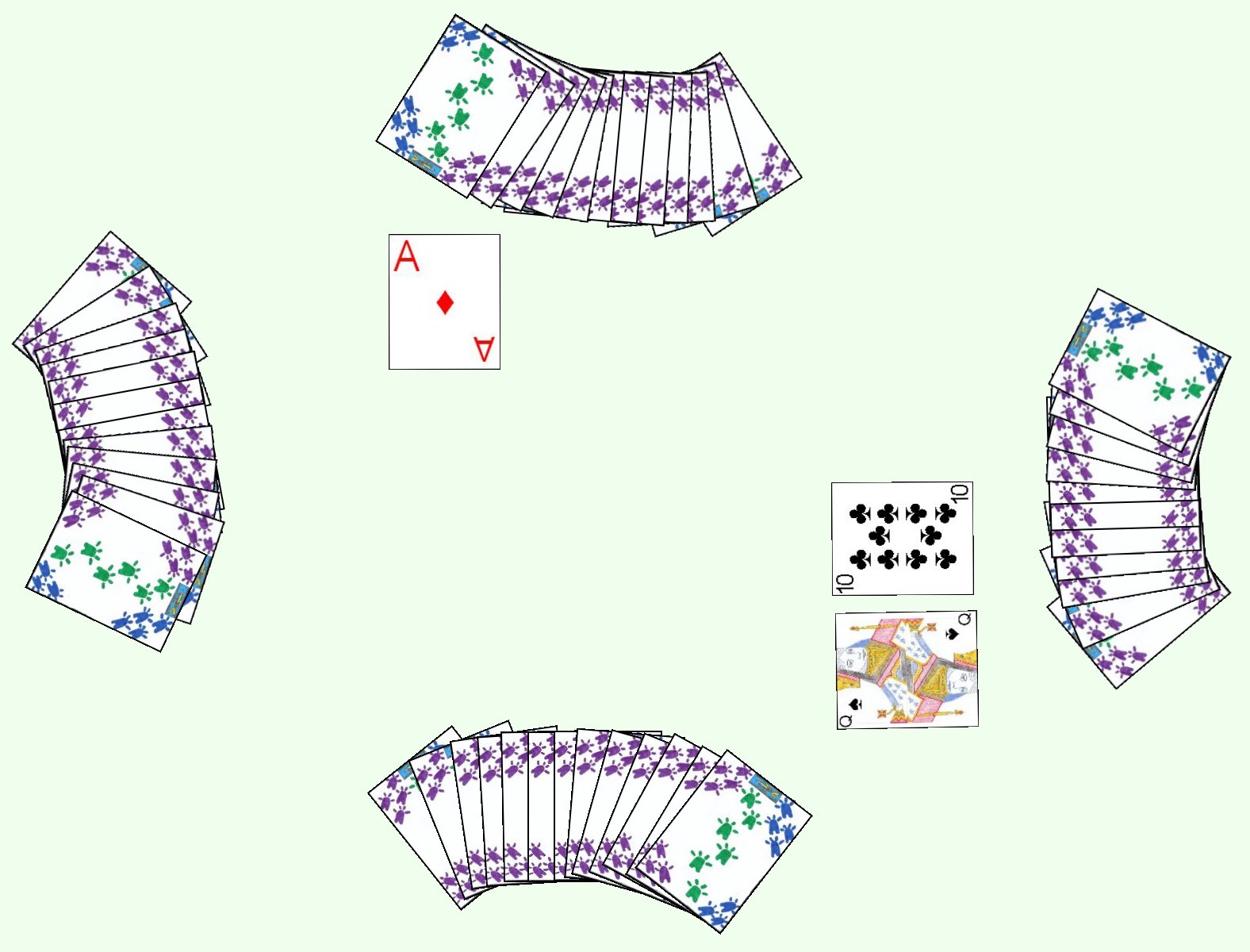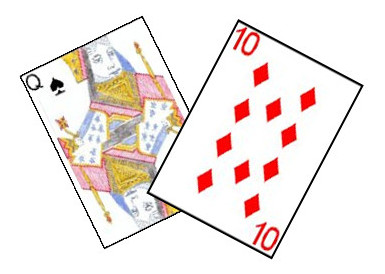
Gong Zhu which roughly translates to "Chase the Pig" or sometimes "Catch the Pig", is a Chinese game which is played similarly to the card game Hearts, and in fact, is sometimes called Chinese Hearts. Gong Zhu is intended to be played by four players all playing independently.
The game uses the standard 52 card deck. The ranking of the cards within the deck used for this game are as follows, from high to low; Ace, King, Queen, Jack, 10, 9, 8, 7, 6, 5, 4, 3, 2.
After determination of seating positions and first dealer, the dealer shuffles and the player to his immediate left cuts the cards. After this cut, the dealer distributes 13 face-down cards to each player, one at a time in a counter-clockwise direction. After the deal, the players pick up and examine their hands. After the first hand, the player who, in the previous hand won the Queen of Spades leads the first card to the first trick. Thusly, by necessity, the player to his immediate left becomes the dealer for that hand.
Unlike many other games of the Heart family, no card passing occurs in this game. The player to the immediate right of the dealer begins play by playing the first card to the first trick. He may play any card of his choice from his hand. Each other player, in turn, must then play a card of the same suit as that led if they have one, with play rotating in a counter-clockwise direction. If they have no cards of the led suit, they may play any card from their hand. The highest card of the suit led to the trick wins the trick and all the cards it contains. This player also plays the first card to the next trick.
At the end of the hand, the players sort through the cards they have won in tricks, scoring appropriately. The object is to earn as many positive points as possible during the hand and minimize the earning of minus points. Each player starts the game with a score of zero. Certain cards captured during the hand can earn the capturer either positive or negative points. The following chart shows the point values earned for capturing the designated cards or special properties of some cards in the deck. Cards not listed in this chart have no scoring value:
| Card | Scoring Value | Notes |
|---|
| Jack of Diamonds (called the Sheep) | 100 | - |
| Queen of Spades (called the Pig) | -100 | - |
| 10 of Clubs | 0 | This card, called the Transformer, doubles the capturing players total points scored for this hand. If the player scores no hearts or other point scoring cards other than the 10 of Clubs, he scores 50 points instead. |
| Ace of Hearts | -50 | - |
| King of Hearts | -40 | - |
| Queen of Hearts | -30 | - |
| Jack of Hearts | -20 | - |
| 5, 6, 7, 8, 9, 10 of Hearts | -10 | Each card of the Hearts suit captured of these denominations scores -10 points. |
If a player manages to capture every card of the Heart suit in the deck, he adds 200 points to his score rather than any subtraction for the Hearts. This is called Shooting the Moon. If a player manages to score every card of the Heart suit as well as the Queen of Diamonds during a hand, he scores the 200 for capturing all cards from the Hearts suit and another 300 positive points for capturing the Pig. If one player manages to get every point scoring card in the game (negative and positive), the game immediately ends and that player is declared the winner and all the other players are declared losers of the game.
 Card Exposure:
Card Exposure: Before the start of a hand and after the deal, any player may elect to expose certain cards from his hand. By exposing a card, its point value is doubled for the current hand. The following cards can be exposed by a player before play of the hand begins.
- Jack of Diamonds (♦):
Exposing this card doubles the point scoring value for this card during the current hand. Thus, the card is worth 200 points to the capturer.
- Queen of Spades (♠):
Exposing the Queen of Spades doubles its value for the player who captures it during the current hand. Thus, the player who captures this card scores -200 points.
- Ace of Hearts (♥):
Exposing the Ace of Hearts doubles the value of all Hearts captured by all players during the hand (including the Ace itself).
- Ten of Clubs (♣):
If the 10 of Clubs is exposed, the scoring value for all cards captured during that hand for the capturer is quadrupled. If the 10 of Clubs is the only scoring card (including any card of the Hearts suit) captured by the player, he scores 100 points for the card instead of the usual 50.
When a player exposes the card in front of himself, he must leave the card face up on the table until he chooses to play it. An exposed card can be played whenever legal by the owner, however, he may not play the card on the first trick in which that suit has been led unless the exposed card is the only card of that suit the player has. Also, an exposed card may not be the first card of that suit that a player leads to a trick unless it is the only card the player has remaining of that suit in his hand. Note that the doubling of scores for any card, including that for the Ace of Hearts and Ten of Diamonds are cumulative, so very large scores can be accumulated during a hand by exposure of key cards.
After points are accumulate at the end of a hand, if any player has a total accumulated score of -1000 or less, that player loses the game with the game ending immediately. The player who has the highest total score is declared the winner. In some informal versions of this game, the player who loses is called the Pig, and is sometimes required to sit under the table for awhile. This player is also usually required to deal the next game.
5 Player Gong Zhu: This variant is played identically to the four player version with the following exceptions. Before the start of the game, the Two of Clubs and Two of Diamonds are removed from the deck. This is done such that the cards used will deal out evenly. Thus, each player will receive a 10 card hand. In all other respects this game is played identically to the four player variant described directly above.
Alternate Scoring Values: A common variant of Gong Zhu is played in such a way that a difference in the value of some the penalty cards, namely some of the cards in the Hearts suit. The following chart shows the scoring value for all cards in this variant:
| Card | Scoring Value |
|---|
| Jack of Diamonds | 100 |
| Queen of Spades | -100 |
| 10 of Clubs | Doubles all points for capturing player |
| Ace of Hearts | -50 |
| King of Hearts | -40 |
| Queen of Hearts | -30 |
| Jack of Hearts | -20 |
| 4 of Hearts | -10 |
| 2, 3, 5, 6, 7, 8, 9, 10 of Hearts | Numerical value printed on the card |
In all other respects this variant is played identically to the base game of Gong Zhu described above.
Start Card: In this variant, the player who has the two of Clubs, leads the first card to the first trick on the first hand of each game. For all other hands during that game, as in the standard game, the player who took the Queen of Spades on the last hand plays the first card to the first trick on the next hand.
Partnership Gong Zhu: This variant is also played identically to the standard version. In this version, before play of the hand, the four players should first determine partnerships using any of the standard methods for doing so. Once determined the players should sit at the table in a manner such that their partner sits directly across from them at the table. The scores of both players is thus combined at the end of every hand. The first partnership to score -1000 points then loses the game with their opponents being declared the winners of the game. All other rules are identical to the standard game as described.
Likha:
Likha is a Middle Eastern game played much like Hearts or Gong Zhu. It is played by four players in two partnerships. Partners should sit at the table directly across from each other. The game is played using the standard 52 card deck with the same card ranking as in Gong Zhu.
Determination of partnerships can be done using any of the standard methods, such as having all players draw cards and the two highest play against the players drawing the two lowest. The player drawing the highest card of all would become the first dealer. After each hand the deal rotates in a clockwise direction.
After determination of partnerships and first dealer, this dealer shuffles and the player to his immediate right cuts. After the cut, the dealer distributes 13 face-down cards to each player, one at a time in a counter-clockwise direction. After the deal each player then picks up his hand, examines it and selects any three cards of his choice to pass to the player to his immediate left. These cards should be passed face-down and a player must pass his three cards before picking up the cards passed by the player at his right and adding them to his hand.
The player to the dealer's immediate right has the first play, leading the first card to the first trick and play to the trick rotates in a counter-clockwise direction around the table. Gameplay at Likha is similar to standard Hearts, with the goal of the players to avoid capturing certain cards in the deck. The following chart shows the point scoring cards used in Likha:
| Card | Scoring Value |
|---|
| Queen of Spades (♠) | 13 |
| Ten of Diamonds (♦) | 10 |
| Each Card of the Heart (♥) Suit | 1 |

All other cards are worth 0 points. The Queen of Spades and Ten of Diamonds are called Likha cards. To begin each trick, the leader plays any card of his choice to a trick and each other player in turn then plays a card to the trick. If the player has a card of the suit originally led to the trick, he must play it. If he does not have a card of the suit led he must play a Likha card to the trick if he has one. If that player also does not have
a Likha card he may play any card from his hand. The winner of each trick leads the first card to the next trick.
After all tricks have been played, the players sort through the tricks they
have won and tally the score of all point value cards captured during the
hand. Although considered a partnership game, each individual player keeps
his own score. If one player captures all the point scoring cards (Queen of
Spades, Ten of Diamonds and every Heart in the deck), that player must add a
total of 37 points to his score (total of all point scoring cards in the deck, plus one additional point).
Once any player reaches or exceeds 101 points at the end of a hand, the game ends and the opposing team is declared the winner of the game. If two or more players from opposing teams exceed 101 points at the end of any hand, the team with the player having the lower score is declared the winning partnership.
On any hand, before the first trick is played but after the pass, a player
having either or both of the Likha cards can elect to expose them. He does
this by exposing the card face-up in front of himself. The card is still
considered part of his hand, but is simply left exposed on the table until
the player chooses to play it to a trick on his normal turn. Exposing the
card in this manner doubles the scoring value for whichever player ends up
capturing the card (thus each Likha card has a point value of 20 points).
Sbeetiya: Sbeetiya is a variant of Likha which is played very similarly to the parent game. The main difference being that in Sbeetiya, there are no partnerships and each player instead plays for himself. Thus, each player retains his own individual score. Once any player reaches 151 points at the end of a hand, the game concludes and the player with the lowest cumulative score is declared the winner. In this version, if both Likha cards are exposed on the same hand (by the same player or two different players) the value of the Heart cards are also doubled during the hand (thus being equal to two points each). In all other aspects, Sbeetiya is played identically to Likha, as described above.
Copyright © 2015 CatsAtCards.com. All rights reserved.
 Gong Zhu which roughly translates to "Chase the Pig" or sometimes "Catch the Pig", is a Chinese game which is played similarly to the card game Hearts, and in fact, is sometimes called Chinese Hearts. Gong Zhu is intended to be played by four players all playing independently.
The game uses the standard 52 card deck. The ranking of the cards within the deck used for this game are as follows, from high to low; Ace, King, Queen, Jack, 10, 9, 8, 7, 6, 5, 4, 3, 2.
Gong Zhu which roughly translates to "Chase the Pig" or sometimes "Catch the Pig", is a Chinese game which is played similarly to the card game Hearts, and in fact, is sometimes called Chinese Hearts. Gong Zhu is intended to be played by four players all playing independently.
The game uses the standard 52 card deck. The ranking of the cards within the deck used for this game are as follows, from high to low; Ace, King, Queen, Jack, 10, 9, 8, 7, 6, 5, 4, 3, 2.
 Card Exposure: Before the start of a hand and after the deal, any player may elect to expose certain cards from his hand. By exposing a card, its point value is doubled for the current hand. The following cards can be exposed by a player before play of the hand begins.
Card Exposure: Before the start of a hand and after the deal, any player may elect to expose certain cards from his hand. By exposing a card, its point value is doubled for the current hand. The following cards can be exposed by a player before play of the hand begins.
 All other cards are worth 0 points. The Queen of Spades and Ten of Diamonds are called Likha cards. To begin each trick, the leader plays any card of his choice to a trick and each other player in turn then plays a card to the trick. If the player has a card of the suit originally led to the trick, he must play it. If he does not have a card of the suit led he must play a Likha card to the trick if he has one. If that player also does not have
a Likha card he may play any card from his hand. The winner of each trick leads the first card to the next trick.
All other cards are worth 0 points. The Queen of Spades and Ten of Diamonds are called Likha cards. To begin each trick, the leader plays any card of his choice to a trick and each other player in turn then plays a card to the trick. If the player has a card of the suit originally led to the trick, he must play it. If he does not have a card of the suit led he must play a Likha card to the trick if he has one. If that player also does not have
a Likha card he may play any card from his hand. The winner of each trick leads the first card to the next trick.